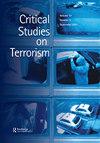Strategic exclusion, co-option and containment: towards an integrative theory of state-CSOs relations
IF 2.5
Q2 POLITICAL SCIENCE
引用次数: 0
Abstract
ABSTRACT Although there have been attempts to theorise state-Civil Society Organizations (CSOs) relations in the Counter-Terrorism (CT) context, including the “co-option and containment” and “duality of coercion” perspectives, these two-way articulations have failed to account for the range of strategic options open to the state in regulating CSOs. This study presents the framework of Strategic Exclusion, Co-option and Containment (SECC) to underscore the general patterns of state engagement of CSOs in the context of CT. It mapped secondary evidence in 19 countries and used three illustrative case studies (Australia, Uganda and Russia) to examine the elements of SECC, namely, states’ exclusion of CSOs in law and policymaking on CT, the use of strategic ambiguity in enacting and interpreting CT laws, delegitimizing or criminalising advocacy and influencing the transformation of CSOs into state adjutants. This pattern of engagement with CSOs is transforming voluntary and associational life in precarious ways. The article advances the Copenhagen School and rational-actor model of global strategic decision-making, and contributes to discourses on the closing of civic spaces, democratic recession and the resurgence of authoritarianism. It lays a foundation for generalisable theory and future empirical research on state behaviour towards CSOs in the context of violence, conflict, and security.战略排斥、合作选择与遏制:走向国家与公民社会组织关系的一体化理论
尽管有人试图在反恐背景下理论化国家与民间社会组织(cso)的关系,包括“合作与遏制”和“胁迫的二元性”观点,但这些双向表述未能解释国家在监管民间社会组织方面的战略选择范围。本研究提出了战略排斥、合作选择和遏制(SECC)框架,以强调公民社会组织在CT背景下的国家参与的一般模式。它绘制了19个国家的二手证据图,并使用了三个说明性案例研究(澳大利亚、乌干达和俄罗斯)来研究SECC的要素,即国家在有关CT的法律和政策制定中排除公民社会组织,在制定和解释CT法律时使用战略模糊性,将宣传非法化或刑事化,以及影响公民社会组织向国家副官的转变。这种与公民社会组织接触的模式正在以不稳定的方式改变志愿和联合生活。这篇文章推进了哥本哈根学派和全球战略决策的理性行为者模型,并对公民空间的关闭、民主衰退和威权主义的复苏的论述做出了贡献。它为在暴力、冲突和安全背景下对公民社会组织的国家行为的推广理论和未来的实证研究奠定了基础。
本文章由计算机程序翻译,如有差异,请以英文原文为准。
求助全文
约1分钟内获得全文
求助全文

 求助内容:
求助内容: 应助结果提醒方式:
应助结果提醒方式:


